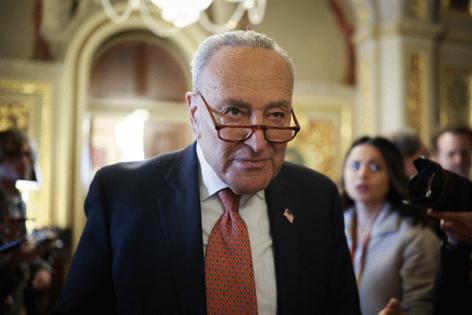David M. Drucker: Government shutdowns never help the instigators
Published in Op Eds
It’s a tale as old as time — or at least, the past three decades. Whether Democratic or Republican, members of Congress angry with the president and searching for some way to fight back against the White House decide to wield the constitutional power of the purse and shut down the federal government.
“We have leverage,” lawmakers have told themselves over the years. “If we hold out, the president will fold and we’ll achieve policy aims we would not have the power to accomplish otherwise.”
It’s a fantasy they talk themselves into believing. It has never worked and it never will.
Even if voters are sympathetic to the holdouts’ demands, the public considers deliberately shutting the lights off in Washington an illegitimate form of political combat. Voters punish the instigators, at least in the short term. Ask Brendan Buck, a Republican operative in Washington who lived this reality during his years on Capitol Hill advising two different GOP speakers of the House.
“It never works,” Buck told me. “No matter how righteous you believe your position is, that gets thrown out the window because all people see is chaos and the consequences of a shutdown and they don’t understand why you can’t just figure that out with the government open.”
Shutting down the government is not simply a political loser, it is a policy loser, too.
“Shutdowns don’t end with a negotiated peace,” he said. “Shutdowns end after one party has endured beatings so long that they ultimately just wave the white flag.”
Let’s review the win-loss record; or should I say, the loss-loss record.
In late 1995, a unified Republican Congress fought with President Bill Clinton over federal spending levels. The ensuing 21-day government shutdown that stretched past New Year’s Day cost the GOP public support and sent Clinton’s job approval rating soaring from 41% before the shutdown to 55% after.
In the fall of 2013, a GOP House of Representatives battled President Barack Obama and a Democratic US Senate over funding for the Affordable Care Act (Obamacare). After 16 days, House Republicans folded with nothing to show for it except a historically low favorability rating.
Yet another shutdown, initiated in early 2018 by Senate Democrats amid a disagreement over immigration policy with President Donald Trump, didn’t end quite as badly. But that’s only because these Democrats, then in the minority, abandoned the effort quickly. Perhaps they concluded there was no political upside or guaranteed policy concessions in the offing. Underscoring the point that the perpetrators always lose, Trump one year later tucked tail and agreed to terms with a Democratic House led by then-Speaker Nancy Pelosi after voters grew frustrated with the 35-day shutdown he caused.
The outcome of the 2013 Obamacare shutdown is particularly instructive.
The backlash over passage of the 44th president’s signature health care overhaul resulted in massive Republican gains in the 2010 midterm elections: 63 House seats and seven Senate seats. Three years later, Obama’s job approval ratings were stuck in the low to mid 40s; voters were still five years away from changing their minds about Obamacare. Yet when House Republicans, pushed by the activist base of their party, took extraordinary measures to stop the Obama administration from implementing the Affordable Care Act, voters balked.
This is similar to the dilemma facing Senate Minority Leader Charles Schumer this month, as Washington stares down the Sept. 30 deadline. The New York Democrat is facing demands from progressive activists, grassroots Democratic voters and even members of his own party in Congress to play hardball with Trump. They want Schumer to use the leverage they imagine Democrats possess, via the Senate filibuster, to force the president to barter on policy.
Ezra Klein, a liberal writer for The New York Times, framed the stakes as even more dire, during a recent episode of his podcast. “Donald Trump is corrupting the government. He’s using it to hound his enemies, to line his pockets, and to entrench his own power. He’s corrupting it the way the mafia would corrupt the industries they controlled,” Klein argued, even as he conceded that shutting down the government is something of a crapshoot. “This is what Donald Trump is doing to the government. This is what Democrats cannot fund. This is what they have to try to stop.”
Klein’s argument has some merit. But it does not change the politics of government shutdowns.
Shutdowns have demonstrated time and again that they simply do not work. Indeed, this cathartic strategy risks boomeranging on Democrats and further empowering Trump. His job approval rating has been holding steady for months at roughly 45%. Voters consistently tell pollsters that what they care about most is not the president’s constitutionally questionable practices, but issues related to the economy — affordability and inflation chief among them.
“The facts and the history are what they are: Whoever forces a shutdown is going to pay a political price for it,” said Larry Ceisler, a public affairs executive in Pennsylvania active in Democratic politics. Schumer so far seems to accept that reality. It’s most likely why he refused to dabble in shutdown politics earlier this year, despite the backlash from some quarters in his own party. But will he be able to resist the siren song of the left again? My guess is that Republicans, staring down the barrel of a difficult 2026 midterm election season, are quietly hoping he won’t.
_____
This column reflects the personal views of the author and does not necessarily reflect the opinion of the editorial board or Bloomberg LP and its owners.
David M. Drucker is columnist covering politics and policy. He is also a senior writer for The Dispatch and the author of "In Trump's Shadow: The Battle for 2024 and the Future of the GOP."
_____
©2025 Bloomberg L.P. Visit bloomberg.com/opinion. Distributed by Tribune Content Agency, LLC.
























































Comments